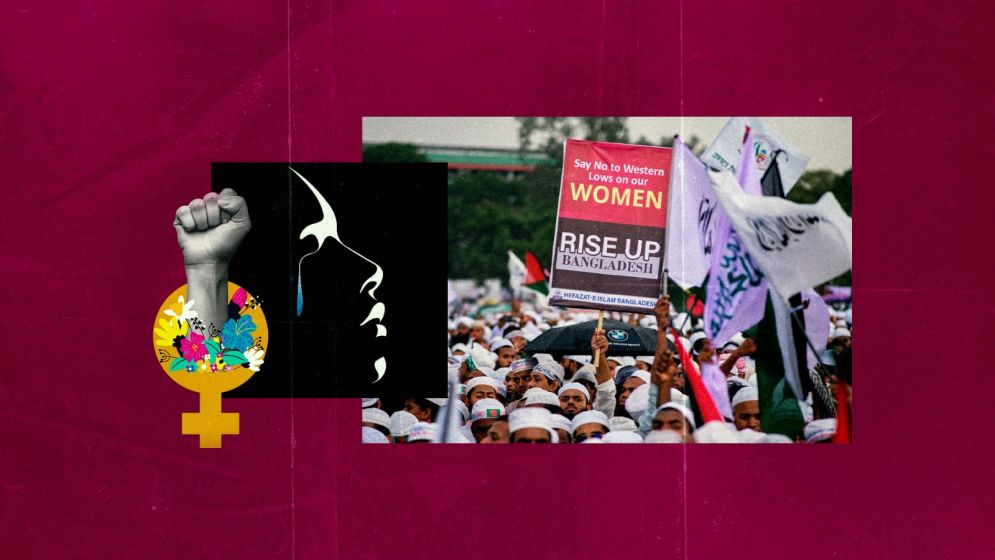Opposing the Women’s Rights Commission only reinforces global anti-Muslim stereotypes

For those of us based in the West and committed—often at significant professional risk—to confronting Islamophobia, one of our most urgent tasks is dismantling the dangerous essentializing myths that underpin it.
Chief among them is the stubborn, deeply entrenched belief that Muslims, as a monolith, are uniquely oppressive toward women.
This essentializing myth isn’t just a fringe fantasy—it is foundational. It fuels the Islamophobic rhetoric that justifies everything from hijab bans in Europe to drone strikes in South Asia.
And in countless conferences, classrooms, and public forums, Muslim and non-Muslim scholars alike have spent years working relentlessly to challenge it, to replace fear and bias with fact.
And yet, even as we chip away at this narrative, extremist forces within the Muslim world are actively—and seemingly gleefully—reinforcing it.
Take, for instance, the Islamists in Bangladesh.
In today’s post-uprising Bangladesh, these actors had a rare historical opportunity: to disarm the narrative that Muslims are inherently hostile to women’s rights.
By adopting a forward-thinking, rights-based approach, they could have upended one of the central justifications for Islamophobic policies in Delhi and Washington alike.
They could have cut directly against the messaging of India’s Hindu nationalist BJP and the West’s self-righteous liberal imperialism.
Instead, they chose the opposite path.
Rather than rejecting the caricature of the Muslim misogynist, they have embraced it. Rather than challenging the myth, they are determined to supply it with fresh evidence.
In lockstep with Sheikh Hasina’s authoritarian regime—whose own politics have long weaponized this very trope—they are taking positions on women’s rights that align uncomfortably well with far-right ideologues in both East and West.
In doing so, they are not just failing to resist global Islamophobia—they are feeding it. They are validating the very story that justifies their community’s racialization, surveillance, marginalization, and militarization.

Understanding
the impact
Let’s be clear: the Islamists in Bangladesh are not just undermining women’s rights at home.
They are sabotaging global efforts to push back against the racist, reductionist narratives that depict Muslims as enemies of modernity, equality, and progress.
They are doing the Islamophobes’ work for them
The “so-called” Islamists of Bangladesh—those now occupying the ground paved with the blood of July’s martyrs—claim to speak for a just order, but their actions betray a deep and dangerous hypocrisy.
Their vision of political Islam is one that fears women’s equality more than it fears tyranny. And in doing so, they dishonor the very movement that gave them their platform and voice.
The July Movement had one clear, irreducible principle: justice. It was a collective cry against authoritarianism, corruption, and impunity. But it also contained within it a radical feminist gesture that should not be forgotten.
During the nationwide protests against Bangladesh's discriminatory quota system, young women stepped forward—not to demand privileges, but to renounce them.
They asked to be seen as equals, not exceptions. This act—women voluntarily giving up reserved job quotas in favor of true equality—is nothing short of revolutionary in the history of Bangladeshi feminism.
And yet, today, the inheritors of that moment—the groups and figures who now march under the post-July banner—cower in the face of that same demand for equality.
They resort to political theatrics, draft statements soaked in patriarchal conservatism, and stay conspicuously silent when women's rights are trampled.
They are not just avoiding the question of gender justice—they are actively reversing the momentum.

Whose
purpose do they actually serve?
Worse still, some of them have taken a sinister turn. In their bid to “grow the numbers” of the Muslim ummah, they now flirt with policies and narratives that echo India’s Hindu nationalist paranoia—advocating for multiple marriages and unchecked childbirth under the guise of religious duty.
It is a grotesque mimicry of the very “population jihad” propaganda that seeks to vilify Muslims in India. The irony is as thick as it is tragic.
But they care little about the quality of that future generation. They want numbers, not minds. They demand submission, not strength.
They seek to preserve women not as equal participants in society but as reproductive instruments and obedient homemakers.
Their stance on women’s rights—from their silence on sexual violence to their refusal to recognize women as autonomous agents—reeks of the same authoritarianism they once opposed.
Let us ask plainly: Can the strength of the Muslim community truly grow in this era of War on Terror 2.0 by keeping half its intellect, power, and creative potential dormant or shackled?
As the far-right consolidates across the globe and Islamophobia becomes a permanent feature of international policy and public discourse, now more than ever is the time to respond with wisdom, science, innovation, and peace—not internal repression and intellectual decay.
What vision of political Islam are you building when your Shariah slogans are paired with a refusal to grant basic equality to women? What does your “resistance” mean when it mirrors the logic of your enemies?
A community cannot rise by suppressing half of itself. And no movement can claim to seek justice while clinging to injustice at home.
If you argue that Bangladesh should be ruled according to dominant religious doctrine, you’re not just making a domestic political statement — you’re joining a global trend with dangerous implications.
That position places you squarely alongside far-right Christian nationalists in the West and the Hindutva hardliners in India, all of whom seek to recast pluralistic societies into theocratic ones.
It’s a worldview that doesn’t stop at national borders. As the late Eqbal Ahmed warned, the creation of a religious state is never an isolated act; it becomes a precedent, a justification for others to do the same.
And in a world already teetering under the weight of sectarian politics, do we really want to light another match?
—-
Nazmul Arefin is a PhD Candidate and Killam Scholar at the University of Alberta, Canada

